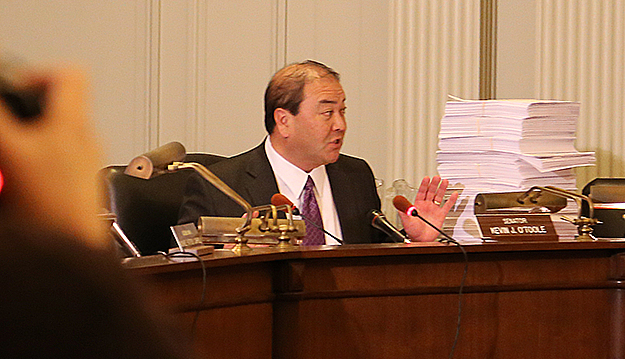The Meeting Before the Meeting

One of the things they teach you in law school is to never ask a question in court or at a deposition that you don’t already know the answer to. The same goes for politics. Never roll out an initiative you really want unless you know you have the votes to pass it. While sometimes we have committee hearings or floor votes where things go sideways due to unforeseen circumstances, typically, the outcome is always scripted. Most of that work is done ahead of time – at the meeting before THE meeting.
Allow me to explain:
The year was 1994 and after working with a small team to pull off a massive upset as our Republican candidate won the County Executive seat by 2500 votes, beating the heavily favored Democrats in a county with a 4-1 ratio of registered Democrats to Republicans, we planned the first organizational meeting for 8 am the next morning.
After a long victory lap that night, followed by an obligatory late-night visit to the Pilgrim Diner, I sat down with my wife (we were married 3 days earlier — yes Beth is a saint) and pulled out a pad and pen to organize thoughts and needs of the upcoming transition. After a few hours of sleep, I, overjoyed, exhausted and excited, headed to the Verona Town Hall at 745am – to be the first one at the 8 am meeting. As I pulled in the parking lot, I noticed a number of familiar cars.
I remember thinking this was weird as I walked up to the second-floor conference room. I remember the shock as this 30-year-old novice, who had taken a 6 month leave of absence from my law practice to run this rag tag campaign, opened the door and saw a handful of “supporters” and so-called close friends of the winning candidate. I recall like yesterday seeing the empty coffee cups and two large (now empty) Dunkin Box of Joe’s and the look on the faces of those in that room —think 8-year child caught with both hands in the cookie jar. It quickly dawned on me that they were dividing up the so-called Andrew Jackson “spoils of the victory.” As Tom Scrivo walked in moments later, I remember telling him loudly —“ we obviously didn’t get the memo on the meeting BEFORE the meeting.”
Many of the early bird attendees were hardly ever seen during the actual campaign, yet most of them hailing from the candidate’s hometown knew well enough to plan an “impromptu” meeting at 7 am before the official meeting was to take place.
I pulled the candidate out of the coffee klatch and said I’m not wasting time with the 8 am meeting as key decisions had already been made and appointments already discussed. After a heated back-and-forth, I undid many of the decisions made at the 7am meeting and agreed to take the unpaid job of Executive Director of the Transition. When offered any job in the new administration, I volunteered to take the Chief of Staff job – for one year and then back to my law practice.
Over several decades, I have worked with hundreds and hundreds of campaign staffers (paid and unpaid), many times in challenging environments and emotionally amped up arenas. While many of these workers were incredibly driven, hard-working and focused on the campaign before them, I’m not quite certain most are suited for work in the more subdued and sanitized world of government.
I do believe that campaign staff should be offered the opportunity to assist the candidate they dedicated their life to helping get elected govern. However, I have long maintained that experience in our business counts for something and that just because you coordinated transportation on the campaign doesn’t mean you get to be the manager of an MVC office.
You can usually breakdown campaign workers and supporters into a few categories:
- Group A: Close friends and family who would support you for dogcatcher;
- Group B: The near zealots who believe in a party/purpose or they so hate the opponent/other party and their principles.;
- Group C: Individuals who work or contribute because they want something – a job, a contract, or the undefinable proximity to power.
Many politicians have a loyalty code that somehow messages back up to the mother ship during the campaign and afterwards converts those supporters to government workers. Sometimes they seek to pull former government officials from public service retirement for reprisal roles or they scour the alumni pages of Ivy League schools for applicants believing that if they did go to Yale, they can surely work in state government. This practice has proven to be a colossal mistake made by Democrat and Republican administrations alike. In politics/government, just like in life, you’re usually better off with a person who has relationships and not just a resume.
As party officials are going through the candidate recruitment and petition process now, with visions of November success and promises of January jobs are made; just remember, as I learned on that morning there are plenty of others that have the same idea. In 1994 the “spoils of victory” were divvied up in a conference room, in 2020, the meeting before the meeting conference room is a group text.
PS – For those of you waiting to board the Chamber Train for this year’s Walk To Washington, don’t forget about my do’s and don’ts list.





